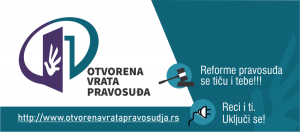In cooperation with the UN Human Rights Unit in Serbia and IPSOS Strategic Marketing, the Belgrade Centre for Human Rights (BCHR) conducted a public opinion survey on the main human rights issues in Serbia.
The survey results paint a dismal picture of the public’s general impressions of the extent to which human rights are respected in Serbia and familiarity with their own rights and how they can protect them.
The fact that 63% of the respondents think that human rights are more or less not respected may reflect their belief that violations of human rights in Serbia are widespread. Furthermore, most respondents think that the very state authorities primarily charged with human rights protection, the prosecutors and the courts, are not autonomous and independent and that the proceedings in which they can claim protection of their rights are overly long. This renders meaningless the purpose of human rights protection and results in public mistrust in the state authorities whose primary role is to protect human rights.
The conclusion that institutional protection and promotion of human rights does not reach all segments of the population is corroborated by the survey results – as many as 72% of the respondents were unable to list any independent human rights protection institutions, such as, e.g. the Protector of Citizens.
The respondents singled out the right to work and freedom of expression/the media as the ones they considered the most jeopardised. Nearly 30% of the respondents who reported that they had been victims of human rights violations in the past decade said that their work-related rights had been breached. Only 29% of the respondents think that there are independent media in Serbia, while as many as 74% think that the press is censored.
The survey results show that a substantial share of the population have misconceptions about the position of specific groups in society. For instance, there are major differences in the views of male and female respondents about the women’s status in society and their participation in public life. As per the rights of national minorities, 64% of the respondents opined that their rights were respected, but as many as 54% were unable to specify any rights guaranteed minorities in Serbia in order to preserve their identity and cultural specificities. Major discrepancies in public views on the status of LGBTI persons were identified as well. Only 23% of the respondents held that their rights were violated, while, on the other hand, 44% of the respondents said that LGBTI persons were discriminated against in Serbia.
The results of this survey raised a number of questions about the status of vulnerable groups and the realisation of human rights in Serbia. They also send a clear signal to decision makers that human rights cannot be reduced only to “ticking the boxes” in the ongoing reforms, that they concern the everyday lives of all Serbia’s citizens and that the latter perceive their own rights and those of other members of society as under-protected. The relatively low level of the respondents’ familiarity with their own rights is also reason for concern and indicates the necessity to raise public awareness of them.
The press release in pdf is available in Serbian here.
The survey results are available in Serbian here.
The results with detailed statistical data are available in Serbian here.








